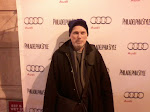Sol LeWitt & Don Imus
When a contributor to Unmuzzled OX dies, I feel obliged to note it publicly. The conceptual artist Sol LeWitt was a sweetheart. Indeed, there’s a circle of close friends who are also all Sol’s ex-girlfriends. Only one seemed to suffer the grief of a truly broken heart.
Upon solicitation, Sol and Lucy Lippard put together particular collaborations for one damn weird issue of Unmuzzled OX after another. When I’d visit him in his studio on Hester Street, Sol always seemed to be watching baseball; I love baseball. But his benign influence extended behind the scenes. Across the hall from Unmuzzled OX, Sol bankrolled a bookstore for artists books called Printed Matter. I love his prosaic mathematical descriptions, e.g. “43 poems in 4 sections, with 18 poems in couplets, written between 1968 and 1978”. Oh wait, that’s not Sol; that’s my first book.
*
Some years ago I threw out my TV and then found myself unexpectedly back in the radio era. Prim, humorless Morning Edition was no match for the satire and lively interviews of Imus in the Morning. It was all so convenient; I could fall asleep during the Mets game and wake up to New Orleans Mayor Ray Nagin sautéing Imus’ white ass. A good laugh is better than a cup of coffee. Of course, sometimes John Kerry would meander on about the latest project with Theresa and you’d think -- why isn’t this bore on NPR? Isn’t that their style?
Of course this week I learned that Mayor Nagin was in fact Bernard McQuirk, the Jonathan Swift of the radio airwaves. He do the police in different voices. I had already discovered that I was confusing Imus impersonations with the real thing in a hotel room where I found simulcast on MSNBC. He concealed his age and bad health beneath a gigantic cowboy hat.
Of course I would often cringe at the insults, and turn it off--that’s the point. The world stinks and stings and the satirist must hold the mirror up. But then, on the Wednesday before Easter, Imus quoted Spike Lee’s, “Jigaboos vs. wannabes” and a rap musician’s “nappy-haired hos” and applied them to NCAA women’s basketball. The I-man’s white ass became toast of a different sort. What actually killed him and his show, I think, was a debate within the African American community where a large group wants to suppress rap music. Imus became their Trojan horse.
*
Back twenty five years ago when I was publishing literally hundreds of art reviews a year, I did not happen to write about Sol. As for Imus, satirists have few friends. For the last dozen years I’ve tried to put words to music, and figure out what that means. Imus was originally a country music disk jockey, and in “Poems to the Tune” I cite the Imus song parodies as the best in the business.
Upon solicitation, Sol and Lucy Lippard put together particular collaborations for one damn weird issue of Unmuzzled OX after another. When I’d visit him in his studio on Hester Street, Sol always seemed to be watching baseball; I love baseball. But his benign influence extended behind the scenes. Across the hall from Unmuzzled OX, Sol bankrolled a bookstore for artists books called Printed Matter. I love his prosaic mathematical descriptions, e.g. “43 poems in 4 sections, with 18 poems in couplets, written between 1968 and 1978”. Oh wait, that’s not Sol; that’s my first book.
*
Some years ago I threw out my TV and then found myself unexpectedly back in the radio era. Prim, humorless Morning Edition was no match for the satire and lively interviews of Imus in the Morning. It was all so convenient; I could fall asleep during the Mets game and wake up to New Orleans Mayor Ray Nagin sautéing Imus’ white ass. A good laugh is better than a cup of coffee. Of course, sometimes John Kerry would meander on about the latest project with Theresa and you’d think -- why isn’t this bore on NPR? Isn’t that their style?
Of course this week I learned that Mayor Nagin was in fact Bernard McQuirk, the Jonathan Swift of the radio airwaves. He do the police in different voices. I had already discovered that I was confusing Imus impersonations with the real thing in a hotel room where I found simulcast on MSNBC. He concealed his age and bad health beneath a gigantic cowboy hat.
Of course I would often cringe at the insults, and turn it off--that’s the point. The world stinks and stings and the satirist must hold the mirror up. But then, on the Wednesday before Easter, Imus quoted Spike Lee’s, “Jigaboos vs. wannabes” and a rap musician’s “nappy-haired hos” and applied them to NCAA women’s basketball. The I-man’s white ass became toast of a different sort. What actually killed him and his show, I think, was a debate within the African American community where a large group wants to suppress rap music. Imus became their Trojan horse.
*
Back twenty five years ago when I was publishing literally hundreds of art reviews a year, I did not happen to write about Sol. As for Imus, satirists have few friends. For the last dozen years I’ve tried to put words to music, and figure out what that means. Imus was originally a country music disk jockey, and in “Poems to the Tune” I cite the Imus song parodies as the best in the business.

